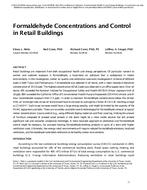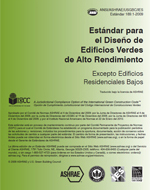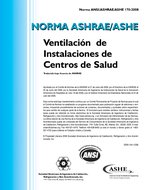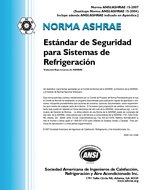Description
Retail buildings are important from both occupational health and energy perspectives. Of particular concern toworker and customer exposure is formaldehyde, a hazardous air pollutant that is widespread in indoorenvironments. In this investigation, indoor air quality and ventilation rates were investigated in 14 stores of differenttypes in both Texas and Pennsylvania. Formaldehyde was detected in all stores, with a mean (standard deviation)concentration of 19 (13) ppb. The highest concentration (67+/-8.3 ppb) was observed in an office supply store. Over allstores, 43% exceeded the National Institute for Occupational Safety and Health (NIOSH) 8-hour exposure limit of16 ppb; 86% exceeded the California Office of Environmental Health Hazard Assessment (OEHHA) chronic and 8-hour recommended exposure limit (7.3 ppb). In order to maintain formaldehyde concentrations below this stricterlimit, air exchange rates across all stores would have to increase on average by a factor of 2.6 (1.8), reaching as highas 2.7+/-0.6 h-1. Such large increases would have a large energy penalty, and might be limited by the capacity of theHVAC equipment available. There are no widely available control technologies for formaldehyde removal at typicalindoor concentrations. Source control (e.g., using different display materials and floor covering, limiting the amountof furniture composed of pressed wood present in the store) might be a more viable solution but still presentsignificant cost and consumer acceptance challenges. A more localized approach to ventilation and formaldehydecontrol might be necessary, for example locating formaldehyde-emitting products in parts of a store with higherventilation rates. Ultimately, low-energy retail environments will require reduced formaldehyde emissions, localizedventilation, and formaldehyde-controlled ventilation to be healthy indoor environments.
Citation: IAQ Conference: IAQ 2013: Environmental Health in Low Energy Buildings
Product Details
- Published:
- 2013
- Number of Pages:
- 8
- File Size:
- 1 file , 490 KB
- Product Code(s):
- D-2013IAQConf-11




